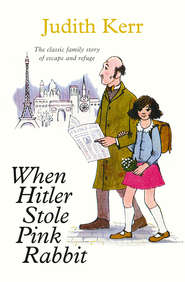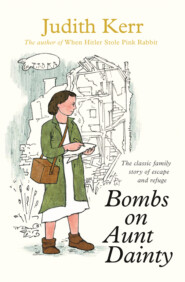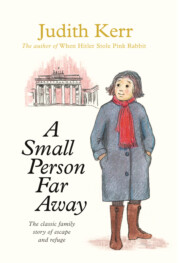По всем вопросам обращайтесь на: info@litportal.ru
(©) 2003-2024.
✖
Out of the Hitler Time trilogy: When Hitler Stole Pink Rabbit, Bombs on Aunt Dainty, A Small Person Far Away
Настройки чтения
Размер шрифта
Высота строк
Поля
“Better go to sleep now,” he said, and she was so tired that very soon she did.
In the morning instead of a postcard they had a long letter. Mama and Papa had decided that they should all live in Paris together and Papa was coming to collect them.
“Papa,” said Anna after the first excitement of seeing him safe and sound had worn off. “Papa, I was a bit upset when I heard about the price on your head.”
“So was I!” said Papa. “Very upset.”
“Were you?” asked Anna, surprised. Papa had always seemed so brave.
“Well, it’s such a very small price,” explained Papa. “A thousand marks goes nowhere these days. I think I’m worth a lot more, don’t you?”
“Yes,” said Anna, feeling better.
“No self-respecting kidnapper would touch it,” said Papa. He shook his head sadly. “I’ve a good mind to write to Hitler and complain!”
Chapter Twelve (#ulink_d4f4d41f-c75d-5221-b72e-32f57d29c5bf)
Frau Zwirn packed the children’s clothes. They said goodbye to their friends and their teachers at school and then they were ready to leave Switzerland for their new life in France. But it wasn’t a bit like leaving Berlin, said Anna, because they would be able to come back and see everyone at the Gasthof Zwirn any time they liked, and Herr Zwirn had already invited them for next summer. They were to live in a furnished flat in Paris which Mama was busy now getting ready. What was it like? Max wanted to know. Papa thought for a moment. If you stood on the balcony, he said at last, you could see the Eiffel Tower and the Arc de Triomphe both at the same time – these were famous Paris landmarks. But beyond this he seemed unable to remember much about it. It was a pity, thought the children, that Papa was sometimes so vague about practical matters. But the fact that the flat had a balcony made it sound rather grand.
The journey to Paris took the whole day and they almost did not get there at all. They had no trouble until Basle, but there they had to change trains because Basle is the frontier between Switzerland, France and Germany. Owing to some delay on the line they arrived very late and only had a few minutes to catch their Paris connection.
“We’ll have to be very quick,” said Papa as the train drew into the station.
Luckily there was a porter immediately at hand. He grabbed their luggage and flung it on to his wheelbarrow.
“The Paris train! Hurry!” cried Papa and the porter set off at a gallop with them all running behind him. Anna had trouble keeping the porter in sight as he turned and twisted through the crowds of people, and Max and Papa were already helping him to heave the luggage aboard the other train when she caught up with them. She stood for a moment, getting her breath back. The train must be just about to leave, for all along it people were leaning out of the windows saying goodbye to their friends on the platform. Immediately beside her a young man seemed in danger of falling right out as he gave his girlfriend a passionate farewell embrace.
“Go on with you!” said the girl and gave him a little push back into the train. As he straightened up, the bottom of the window came into view. There was a printed notice stuck on it. It read STUTTGART.
“Papa!” screamed Anna. “This is the wrong train! It’s going to Germany!”
“Good God!” said Papa. “Get the luggage off, quick!”
He and Max dragged the suitcases off again as fast as they could. Then they heard the whistle.
“Never mind!” shouted Papa and pulled Max back, even though there was a suitcase still left on the train.
“That’s our case!” shouted Max. “Please give us our case!” and just as the carriage began to move the young man with the girlfriend kindly pushed it on to the platform for them. It landed at Anna’s feet and they stood there, with luggage littered all round them, and watched the train steam out of the station.
“I clearly told you the Paris train!” said Papa, angrily looking round for the porter. But there was no sign of him. He had disappeared.
“If we’d got on that train,” asked Anna, “would we have been able to get off before it got to Germany?”
“Possibly,” said Papa. “If we’d realized it was the wrong train.” He put an arm round her shoulders. “I’m certainly very glad you noticed before we ever got on it.”
It took some time to find another porter and Papa was sure they had missed the Paris connection, but in fact they caught it with time to spare. Its departure time had been put back to fit in with the delay on the Swiss line. It was odd that the first porter had not known about this.
As they sat in their compartment waiting for the French train to start Max suddenly said, “Papa, do you think that porter took us to the wrong train on purpose?”
“I don’t know,” said Papa. “It could just have been a mistake.”
“I don’t think it was a mistake,” said Max. “I think he was trying to earn the thousand marks on your head.”
For a moment they sat thinking about it, and about what would have happened if they had travelled to Germany. Then the whistle went and the train started with a jolt.
“Well,” said Papa, “if that porter really was trying to earn a thousand marks he certainly made a bad bargain. I never had time even to give him a tip.” He smiled and settled back in his seat. “And in a few minutes, thanks to Anna, we’ll be not in Germany but in France. And thanks to Max we’ve even got all our luggage.” He lifted his hands in mock admiration. “Psssh!” said Papa. “What clever children I have!”
They arrived in Paris after dark and very tired. Anna had already sensed something different in the train after leaving Basle. There had been more French voices talking quickly, sharply and incomprehensibly. The smells from the dining-car had been different too. But now that she was standing on the platform in Paris she was overwhelmed.
All round her there were people shouting, greeting each other, talking, laughing. Their lips moved quickly, their mobile faces keeping pace with them. They shrugged, embraced each other and waved their hands to emphasize what they were saying – and she could not understand a word. For a moment, in the dim light and the noise and the steam drifting back from the engine, she felt quite lost. But then Papa was bundling her and Max into a taxi and they were charging through the crowded streets.
There were lights everywhere, people walking along wide pavements, eating and drinking in the glass-fronted cafés, reading newspapers, looking into shop windows. She had forgotten a big city was like this. The height of the buildings amazed her, and the noise. As the taxi swayed and turned in the traffic, unfamiliar cars and buses and coloured electric signs which she could not read loomed out of the darkness and disappeared again.
“There’s the Eiffel Tower!” cried Max – but she turned too late and missed it.
Then they were driving round a huge open space with a floodlit arch in the middle. There were cars everywhere, most of them blowing their horns.
“That’s the Arc de Triomphe,” said Papa. “We’re nearly there.”
They turned into a quieter avenue and then off it into a little narrow street, and then the taxi stopped quite suddenly with a squeal of brakes. They had arrived.
Anna and Max stood in the cold outside a tall house while Papa paid the taxi driver. Then he opened the front door and pushed them into the hall where a lady was sitting half-asleep in what appeared to be a glass-fronted cage. As soon as she saw Papa the lady leapt into life. She rushed out of what turned out to be a door in her cage and shook him by the hand, talking very quickly in French all the time. Then, still talking, she shook hands with Max and Anna who, unable to understand, could only smile weakly in reply.
“This is Madame la concierge,” said Papa. “She looks after the house.”
The taxi driver came in with the luggage and Madame la concierge helped him to push some of it through a narrow door which she then held open for Anna and Max. They could hardly believe their eyes.
“Papa!” said Max. “You never told us there was a lift!”
“It’s very, very grand,” said Anna.
This made Papa laugh.
“I’d hardly call it that,” he said. But Anna and Max were not convinced, even when the lift creaked and groaned horribly as it rose slowly up to the top floor. At last it stopped with a bang and a shudder, and even before they had all got out a door opposite them flew open and there was Mama.
Anna and Max rushed to her, and all became confusion while she hugged them and they both tried to tell her everything that had happened since they had last seen her, and Papa came in with the suitcase and kissed Mama, and then the concierge brought in the rest of the cases and all at once the tiny hall was crammed with luggage and no one could move.
“Come into the dining room,” said Mama. It was not much bigger but the table was laid for supper and it looked bright and inviting.
“Where can I hang my coat?” called Papa from the hall.
“There’s a hook behind the door,” Mama called back in the middle of a noisy description by Max of how they had nearly caught the wrong train. Then there was a crash as of someone falling over something. Anna heard Papa’s polite voice saying, “Good evening”, and the mild smell of burning which Anna had noticed ever since their arrival suddenly became intensified.
A small glum figure appeared in the doorway.
“Your fried potatoes have gone all black,” it announced with obvious satisfaction.
“Oh, Grete …!” cried Mama. Then she said, “This is Grete from Austria. She is in Paris to learn French and is going to help me with the housework when she isn’t studying.”









